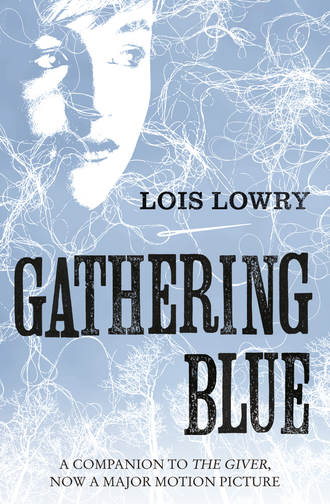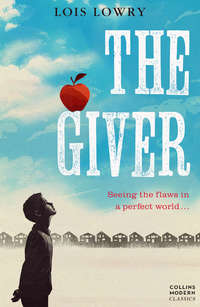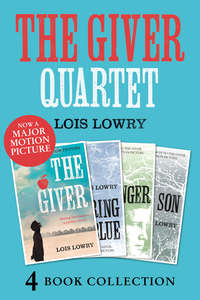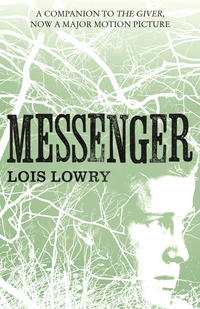
Полная версия
Gathering Blue
Finally only Vandara still held her weapon. Glaring, Vandara menaced her, bending her elbow as if to throw. But at last she too dropped the rock on the ground, with a slight harmless toss toward Kira.
“I will take her to the Council of Guardians then,” Vandara announced to the women. “I am willing to be her accuser. Let them cast her out.” She laughed harshly. “No need for us to waste a life getting rid of her. By sunset tomorrow this ground can be ours and she will be gone. She will be in the Field, waiting for the beasts.”
The women all glanced toward the forest, deep in shadows now: the place where the beasts waited. Kira forced herself not to follow their looks with her own eyes.
With the same hand that had held the rock, Vandara stroked the scar on her throat. She smiled cruelly. “I remember what it was like,” she said, “to see your own blood pour upon the ground.
“I survived,” she reminded them all. “I survived because of my strength.
“By night-start tomorrow, when she feels the claws at her throat,” she went on, “this two-syllable mistake of a girl will wish she had died of sickness beside her mother.”
Nodding in agreement, the women turned their backs on Kira and moved away, scolding and kicking at the small tykes by their sides. The sun was low in the sky now. They would attend to their evening tasks, preparing for the return of the village men, who would need food and fire and the wrapping of wounds.
One woman was soon to give birth; perhaps that would happen tonight, and the others would attend her, muffling her cries and assessing the value of the infant. Others would be coupling tonight, creating new people, new hunters for the future of the village as the old ones died of wounds and illness and age.
Kira did not know what the Council of Guardians would decide. She knew only that whether she was to stay or go, to rebuild on her mother’s piece of land or to enter the Field and face the creatures who were waiting in the forest, she would have to do it alone. Wearily she sat on the ash-blackened earth to wait for night.
She reached for a nearby piece of wood and turned it over in her hands, measuring its strength and its straightness. For a cott, should she be permitted to stay, she would need some sturdy lengths of solid wood. She would go to the woodcutter named Martin. He had been her mother’s friend. She could barter with him, maybe offering to decorate a fabric for his wife, in exchange for the beams she would need.
For her future, for the work with which she thought she might earn her living, she would also need some small, straight pieces of wood. This one was too pliable and would not do, she realized, and dropped it on the ground. Tomorrow, if the Council of Guardians decided in her favor, she would look for the kind of wood she needed: short, smooth pieces she could fit together at the corners. She was already planning to build a new threading frame.
Kira had always had a clever way with her hands. When she was still a tyke, her mother had taught her to use a needle, to pull it through woven fabric and create a pattern with colored threads. But suddenly, recently, the skill had become more than simple cleverness. In one astounding burst of creativity, her ability had gone far beyond her mother’s teaching. Now, without instruction or practice, without hesitancy, her fingers felt the way to twist and weave and stitch the special threads together to create designs rich and explosive with color. She did not understand how the knowledge had come to her. But it was there, in her fingertips, and now they trembled slightly with eagerness to start. If only she was allowed to stay.

A MESSENGER, BORED AND scratching at an insect bite on his neck, came to Kira in the dawn and told her that she must report to the Council of Guardians at late morning. When the sun was approaching midday, she tidied herself and went, obedient to his instruction.
The Council Edifice was surprisingly splendid. It remained from before the Ruin, a time so far past that none of the people now living, none of their parents or grandparents, had been born. The people knew of the Ruin only from the Song that was presented at the yearly Gathering.
Rumor said that the Singer, whose only job in the village was the annual presentation of the Song, prepared his voice by resting for days and sipping certain oils. The Ruin Song was lengthy and exhausting. It began with the beginning of time, telling the entire story of the people over countless centuries. It was frightening too. The story of the past was filled with warfare and disasters. Most especially it was frightening when it recalled the Ruin, the end of the civilization of the ancestors. Verses told of smoky, poisonous fumes, of great fractures in the earth itself, of the way huge buildings toppled and were swept away by the seas. All of the people were required to listen each year, but sometimes mothers protectively covered the ears of their smallest tykes during the description of the Ruin.
Very little had survived the Ruin, but somehow the structure called the Council Edifice had remained standing and firm. It was immeasurably old. Several windows still contained patterned glass of deep reds and golds, amazing things, for knowledge of the way of making such remarkable glass had been lost. Some remaining windows, ones in which the colored glass had shattered, were now paned in a thick, ordinary glass that distorted the view through bubbles and ripples. Other windows were simply boarded over, and parts of the building’s interior were darkly shadowed. Still, the Edifice was magnificent in comparison to the ordinary sheds and cottages of the village.
Kira, reporting near midday as she had been ordered by the messenger, walked alone down a long hallway lit on either side by sputtering flames from tall sconces fed with oil. She could hear the voices of the meeting ahead, behind a closed door: men’s voices in muted arguing. Her stick thumped on the wooden floor and the foot of her flawed leg brushed the boards with a sweeping sound, as if she dragged a broom.
“Take pride in your pain,” her mother had always told her. “You are stronger than those who have none.”
She remembered that now and tried to find the pride that her mother had taught her to feel. She straightened her thin shoulders and smoothed the folds of her coarsely woven shift. She had washed carefully in the clear stream water and had cleaned her nails with a sharp twig. She had combed her hair with the carved wooden comb that had been her mother’s and which she had added to her own small storage sack after her mother’s death. Then she had braided her hair, using her hands to interweave the thick dark strands deftly, tying the end of the heavy plait with a leather strip.
Steadying her apprehensions with a deep breath, Kira knocked on the heavy door to the room where the Council of Guardians’ meeting was already in progress. It opened a crack, spilling a wedge of light into the dim hall. A man looked out and eyed her suspiciously. He widened the opening and gestured her inside.
“The accused orphan girl Kira is here!” the door guard announced, and the muttering subsided. In silence they all turned to watch her enter.
The chamber was huge. Kira had been there before, with her mother, on ceremonial occasions like the annual Gathering. Then, they had sat with the crowds on rows of benches, facing the stage that was furnished only with an altar table holding the Worship-object, the mysterious wooden construction of two sticks connected to form a cross. It was said to have had great power in the past, and the people always bowed briefly and humbly toward it in respect.
But now she was alone. There were no crowds, no ordinary citizens, only the Council of Guardians: twelve men who sat facing her across a long table at the foot of the stage. Rows of oil lamps made the room bright, and each of the men had his personal torch behind him, illuminating stacked and scattered papers that lay on the table. They watched her as she made her way hesitantly up the aisle.
Quickly, remembering the procedure that she had seen at every ceremony, Kira arranged her hands in a reverent position, cupped together, fingertips below her chin, as she arrived at the table and looked respectfully toward the Worship-object on the stage. The guardians nodded approvingly. Apparently it had been the right gesture. She relaxed a bit, waiting, wondering what would happen next.
The door guard responded to a second knock and announced a second entry. “The accuser, Vandara!” he called.
So: it was to be the two of them. Kira watched as Vandara strode rapidly toward the table until they were side by side, facing the Council of Guardians. It gave her a small feeling of satisfaction to notice that Vandara’s feet were bare and her face dirty; the woman had made no special preparations. Perhaps none was necessary. But Kira felt that possibly she had gained a small bit of respect, a small advantage, with her cleanliness.
Vandara made the worshipful gesture with her hands. So they were even there. Then Vandara bowed, and Kira saw with a twinge of concern that the Guardians nodded their heads toward her.
I should have bowed. I must find an occasion to bow.
“We meet to pass judgment on a conflict.” The chief guardian, a white-haired man with a four-syllable name that Kira could never remember, spoke in an authoritative voice.
I had no conflict. I only wanted to rebuild my cott and live my life.
“Who is the accuser?” the white-haired man asked. Of course he knew the answer, Kira thought. But the question seemed to be ceremonial, part of the formal proceedings. It was answered by another of the guardians, a heavy-set man at the end of the table who had several thick books and a stack of papers in front of him. Kira eyed the volumes curiously. She had always yearned to read. But women were not allowed.
“Chief guardian, the accuser is the woman Vandara.”
“And the accused?”
“The accused is the orphan girl Kira.” The man glanced at the papers but didn’t seem to be reading anything.
Accused? What am I accused of? Hearing the repetition of the word, Kira felt a wave of panic. But I can use it as a chance to bow and show humility. She inclined her head and upper body slightly, acknowledging herself as the accused.
The white-haired man looked at the two of them dispassionately. Kira, leaning on her stick, tried to stand as straight as possible. She was almost as tall as her accuser. But Vandara was older, heavier, and unflawed except for the scar, the reminder that she had fought a beast and escaped alive. Hideous though it was, the scar emphasized her strength. Kira’s flaw carried no illustrious history, and she felt weak, inadequate, and doomed beside the disfigured, angry woman.
“The accuser will speak first,” the chief guardian instructed.
Vandara’s voice was firm and bitter. “The girl should have been taken to the Field when she was born and still nameless. It is the way.”
“Go on,” the chief guardian said.
“She was imperfect. And fatherless as well. She should not have been kept.”
But I was strong. And my eyes were bright. My mother told me. She wouldn’t let me go. Kira shifted her weight, resting her twisted leg, remembering the story of her birth, and wondering if she would have an opportunity to tell it here. I gripped her thumb so tightly.
“We have all tolerated her presence for these years,” Vandara went on. “But she has not contributed. She cannot dig or plant or weed, or even tend the domestic beasts the way other girls her age do. She drags that dead leg around like a useless burden. She is slow, and she eats a lot.”
The Council of Guardians was listening carefully. Kira’s face felt warm with embarrassment. It was true, that she ate a lot. It was all true, what her accuser was saying.
I can try to eat less. I can go hungry. In her mind, Kira prepared her defense, but even as she did, she felt that it would be weak and whining.
“She was kept, against the rules, because her grandfather was still alive and had power. But he is long gone, replaced by a new leader with more power and wisdom—”
Vandara oozed compliments designed to strengthen her case, and Kira glanced at the chief guardian to see if he was swayed by the flattery. But his face was impassive.
“Her father was killed by beasts even before her birth. And now her mother is dead,” Vandara went on. “There is even reason to think that her mother may have carried an illness that will endanger others—”
No! She was the only one to fall ill! Look at me! I lay beside her when she died, and I am not ill!
“—and the women need the space where their cott was. There is no room for this useless girl. She can’t marry. No one wants a cripple. She takes up space, and food, and she causes problems with the discipline of the tykes, telling them stories, teaching them games so that they make noise and disrupt the work—”
The chief guardian waved his hand. “Enough,” he announced.
Vandara frowned and fell silent. She bowed slightly.
The chief guardian looked around the table at the eleven others as if he sought comments or questions. One by one they nodded at him. No one said anything.
“Kira,” the white-haired chief guardian said, “as a two-syllable girl, you are not required to defend yourself.”
“Not defend myself? But—” Kira had planned to bow again, but forgot in her urgency. Now she remembered, but her bow was an awkward afterthought.
He waved his hand again, signaling her silence. She forced herself to be still and to listen.
“Because of your youth,” he explained, “you have a choice. You may defend yourself—”
She interrupted again, unable to stop. “Oh, yes! I want to def—”
He ignored her outburst. “Or we will appoint a defender on your behalf. One of us will defend you, using our greater wisdom and experience. Take a moment to think about this, because your life may depend upon it, Kira.”
But you are strangers to me! How can you tell the story of my birth? How can you describe my bright eyes, the strength of my hand as I gripped my mother’s thumb?
Kira stood helplessly, her future at stake. She felt the hostility beside her; Vandara’s breath was quick and angry though her voice had been silenced. She looked at the men seated around the table, trying to assess them as defenders. But she felt from them neither hostility nor much interest, just a sense of expectation as they waited for her decision.
As Kira agonized, her hands pushed their way into the deep pockets of her woven shift. She felt the familiar outline of her mother’s wooden comb and stroked it for comfort. With her thumb she felt a small square of decorated woven cloth. She had forgotten the strip of cloth in the recent confusing days; now she remembered how this one, this design, had come, unbidden to her hands as she sat beside her mother in the last days.
When she was much younger, the knowledge had come quite unexpectedly to her, and she recalled the look of amazement on her mother’s face as she watched Kira choose and pattern the threads one afternoon with a sudden sureness. “I didn’t teach you that!” her mother said, laughing with delight and astonishment. “I wouldn’t know how!” Kira hadn’t known how either, not really. It had come about almost magically, as if the threads had spoken to her, or sung. After that first time, the knowledge had grown.
She clutched the cloth, remembering the sense of certainty it had given to her. She felt none of that sureness now. A speech of defense was not within her. She knew she would have to relinquish that role to one of these men, all strangers.
She looked at them with frightened eyes and saw one looking calmly, reassuringly back. She sensed his importance to her. She sensed something more: awareness, experience. Kira took a deep breath. The threaded cloth was warm and familiar in her hand. She trembled. But her voice was certain. “Please appoint a defender,” she said.
The chief guardian nodded. “Jamison,” he said firmly and nodded to the third man on his left.
The man with the calm, attentive eyes rose to defend Kira. She waited.

SO THAT WAS his name: Jamison. It was not familiar to her. There were so many in the village, and the separation of male and female was so great, after childhood had ended.
Kira watched him stand. He was tall, with longish dark hair neatly combed and clasped at the back of his neck with a carved wooden ornament that she recognized as the work of the young woodcarver—what was his name? Thomas. That was it. Thomas the Carver, they called him. He was still a boy, no older than Kira herself, but already he had been singled out for his great gifts, and the carvings that came from his skilled hands were much in demand among the elite of the village. Ordinary people did not ornament themselves. Kira’s mother had worn a pendant hanging from a thong around her neck but she kept it hidden, always, inside the neck of her dress.
Her defender picked up the stack of papers on the table before him; Kira had watched him marking these papers meticulously as he listened to the accuser. His hands were large, long-fingered, and sure in their movements; no hesitancy, no uncertainty. She saw that he wore a bracelet of braided leather on his right wrist, and that his arm, bare above the bracelet, was sinewy and muscular. He was not old. His name, Jamison, was still three syllables, and his hair had not grayed. She judged him to be midlife, perhaps the same age that her mother had been.
He looked down at the top paper of the stack in his hands. From where she stood, Kira could see the markings that he was examining. How she wished she could read!
Then he spoke. “I will address the accusations one by one,” he said. Looking at the paper, he repeated the words that Vandara had said, though he did not imitate her rage-laden tone. “The girl should have been taken to the Field when she was born and still nameless. It is the way.’”
So that was what he had marked! He had written the words so that he could repeat them! Painful though it was to hear the accusations repeated, Kira realized with awe the value of the repetition. There would be no argument, afterward, about what had been said. How often among the tykes fistfights and battles had begun from You said, I said, He said that you said, and the infinite variations.
Jamison set the papers on the table and picked up a heavy volume bound in green leather. Kira noticed that each of the guardians had an identical volume.
He opened to a page he had marked during the proceedings. Kira had seen him turning the pages of the volume as Vandara had made her accusatory presentation.
“The accuser is correct that it is the way,” Jamison said to the guardians. Kira felt stricken by the betrayal. Hadn’t he been appointed her defender?
He was pointing now to a page, to its densely written text. Kira saw some of the men turn in their green volumes, finding the same passage. Others simply nodded, as if they remembered it so clearly there was no need to reread.
She saw Vandara smile slightly.
Defeated, Kira felt again the small cloth square in her pocket. Its warmth was gone. Its comfort was gone.
“Turning, though,” Jamison was saying, “to the third set of amendments—”
The guardians all turned pages in their books. Even those whose volumes had remained closed now picked them up and looked for the place.
“It is clear that exceptions can be made.”
“Exceptions can be made,” one of the guardians repeated, reading the words, his fingers moving on the page.
“So we may set aside the assertion that it is the way,” Jamison announced with certainty. “It need not always be the way.”
He is my defender. Perhaps he will find a way to let me live!
“Do you wish to speak?” the defender asked Kira.
Touching her scrap of cloth, she shook her head no.
He went on, consulting his notes. “She was imperfect. And fatherless as well. She should not have been kept.” The second repetition hurt, because it was true. Kira’s leg hurt too. She was not accustomed to standing so still for so long. She tried to shift her weight to ease the pressure on her flawed side.
“These accusations are true.” Jamison repeated the obvious, in his steady voice. “The girl Kira was imperfect at birth. She had a visible and incurable defect.”
The guardians were staring at her. So was Vandara, with contempt. Kira was accustomed to stares. She had been taunted throughout her childhood. With her mother as teacher and guide, she had learned to hold her head high. She did so now, looking her judges in the eyes.
“And fatherless as well,” Jamison continued.
In her memory, Kira could hear her mother’s voice explaining it to her. She was small then, and wondering why she had never had a father. “He did not return from the great hunt. It was before you were born,” her mother said gently. “He was taken by beasts.”
She heard Jamison repeat the words of her thoughts as if they had been audible. “Before her birth, her father was taken by beasts,” Jamison explained.
The chief guardian looked up from his papers. Turning to the others at the table, he interrupted Jamison. “Her father was Christopher. He was a fine hunter, one of the best. Some of you probably remember him.”
Several of the men nodded. Her defender nodded as well. “I was with the hunting party that day,” he said. “I saw him taken.”
You saw my father taken? Kira had never heard the details of the tragedy. She knew only what her mother had told her. But this man had known her father. This man had been there!
Was he afraid? Was my father afraid? It was a strange, unbidden question, and she did not ask it aloud. But Kira was so afraid herself. She could feel Vandara’s hatred as a presence by her side. She felt as if she were being taken by beasts; as if she were about to die. She wondered what the moment had been like for her father.
“The third amendment applies here, as well,” Jamison announced. “To the accusation ‘She should not have been kept,’ I reply that according to the third amendment, exceptions may be made.”
The chief guardian nodded. “Her father was a fine hunter,” he said again. The others at the table, taking their lead from him, murmured in agreement.
“Do you wish to speak?” they asked her. Again she shook her head. Again she felt, for the moment, spared.
“‘But she has not contributed,’” Jamison read next. “‘She cannot dig or plant or weed, or even tend the domestic beasts the way other girls her age do. She drags that dead leg around like a useless burden. She is slow,’” he continued, and then Kira saw a hint of a smile as he concluded, “‘and she eats a lot.’”
The man stood silent for a moment. Then he said, “As defender, I am going to concede some of these points. It is clear that she cannot dig or plant or weed or tend domestic beasts. I believe, however, that she has found a way to contribute. Am I correct, Kira, that you work at the weaving shed?”
Kira nodded, surprised. How did he know? Men paid no attention to the work of women.
“Yes,” she said, her voice soft from nervousness. “I help there. Not with the actual weaving. But I clean up the scraps and help prepare the looms. It is work I can do with my hands and arms. And I am strong.”
She wondered if she should mention her skill with the threads, her hope that perhaps she could use it as a way of making a living. But she couldn’t think of a way to say it without sounding vain, so she kept still.






